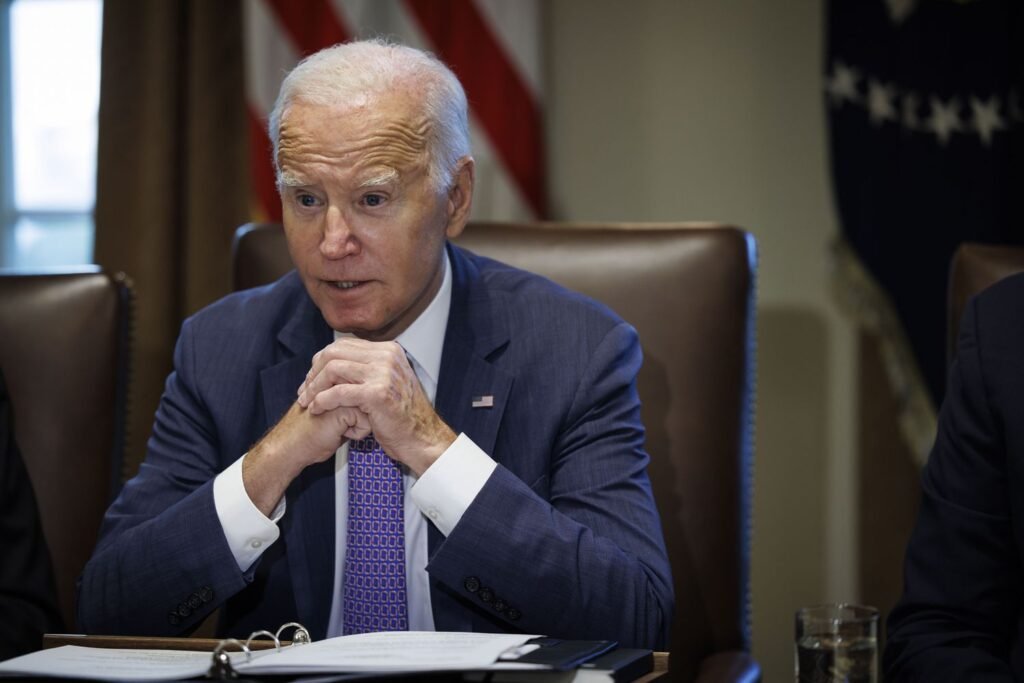
On January 20, with Donald Trump taking office as the 47th President of the United States, it signified the conclusion of Joe Biden’s fifty-year tenure in Washington. Biden now becomes part of the group of almost a dozen one-term presidents in US history, with only four of them since World War II. Joining Biden on the list of modern one-term presidents are Gerald Ford, Jimmy Carter, and George HW Bush.
Thus, how will the Biden administration be viewed in the future? What impact does he leave for future generations?
Job Approval Second Lowest of Any Post-WWII President
A Gallup poll indicates that Joe Biden had an average job approval rating of 42.2 percent throughout his four-year presidency, marking the second lowest in the history of Gallup polling. Biden’s low job approval was marked by significant differences between political parties, a trend that has become more common for recent presidents. Biden’s concluding job approval rating from a recent Gallup poll stands at 40 percent.
Regarding Gallup job approval ratings, Biden’s score has been slightly higher—by one percentage point—compared to Donald Trump, his predecessor (and now successor), who recorded the lowest job approval rate. Prior to that, Jimmy Carter and Harry Truman held the lowest averages during their terms as presidents.
According to a recent poll (The Associated Press-NORC Centre for Public Affairs Research), merely 25% of Americans believe that Biden, a Democrat, was a good or great president. That figure is less than the opinions of the twice-impeached Trump, a Republican, as he departed from office shortly after the January 6, 2021, assault on the US Capitol and amid the lethal peaks of the coronavirus pandemic.
Transitional, Transformational, or Interregnum
Four years back, when Joe Biden took office in Washington, he promised to bring the nation together, bolster the Democratic Party, and uphold democratic values. Moreover, he took on the presidency with a pledge to serve as a transitional leader, yet upon his inauguration, Biden displayed a portrait of Franklin Delano Roosevelt above the fireplace in the Oval Office, clearly indicating his desire to be a transformational president rather than merely transitional.
As Biden’s four-year noisy, chaotic term concludes, and as the 82-year-old president leaves on his helicopter, with Washington fading from view, the capital now belongs to his bitter adversary Donald Trump, whose comeback was what Biden aimed to avert the most.
In what way will Biden be remembered? Furthermore, since the US is even more polarized than when he assumed office, the Democratic Party is in disarray.
The likelihood is strong that history will view him as a president who served merely as an interregnum, an acting leader between two terms of Trump, whom he once called a fascist and a danger to democracy.
Five Decades of Influence: From Youngest to Eldest
Fifty-two years ago, Joseph Robinette Biden Jr., known as Joe Biden, reached Washington as the youngest senator in US history, assuming office in 1973 at just 30 years old, the minimum required by the Constitution.
Throughout his career spanning over fifty years, Biden sought the presidency on two occasions, failing both times, prior to becoming Barack Obama’s vice-presidential candidate in 2008. When Obama left office after eight years, many assumed that Biden, at seventy-four, was too old to run for the presidency again.
However, he astonished his skeptics, captured the Democratic nomination, and defeated Trump in the campaign to become the 46th president, pledging efficiency and skill instead of disorder.
Sent to the Past
In the 19-minute goodbye speech from the Oval Office on Wednesday night, this is what Biden expressed.
“It will require time to experience the complete effect of everything we’ve accomplished together.” However, the seeds have been sown, and they will thrive, blossoming for many years ahead.
However, the kind of America Biden departs from may see the seeds he has sown take decades to flourish.
When Joe Biden became president four years back, he aimed to “restore the soul” of America and demonstrate that Donald Trump was merely a minor detail in the nation’s narrative, rather than its continuation. Biden pledged to make Trump a mere footnote in American history and to move on from him. However, on Monday he was succeeded by his rival, Trump.
As Biden leaves the White House, a real threat arises that he, having infamously suspended his presidential campaign for the second time months before the election, may soon fade from memory, becoming a part of history.
Here is a summary of the positive and negative aspects of the four-year presidency of Joe Biden:
Downside of the Account
Presidential legacies are “complex issues,” notes The Atlantic, but as Biden exits the White House, he appears “more of a historical parenthesis than a transformational leader.” His unfavorable aspects overshadow his significant accomplishments as president. Here are the key ones:
Firstly, the hypocrisy of paternal leniency—while in office, Biden consistently promised not to grant a pardon to his son Hunter, who was found guilty of three felony gun offenses. However, as Trump was elected, Biden, in the final weeks of his presidency, did exactly that—granting a pardon to his son, a move that faced significant criticism from both Democrats and Republicans.
And what a leniency it was—renouncing his stated commitment to “accept the outcomes of the justice system as a matter of principle”, Biden “issued a broad pardon for his son for any offenses he might have perpetrated during an 11-year span”.
Following Biden’s blunder, Democrats are unable to maintain the morally superior stance regarding Trump.
Secondly, the second instance of folly—during the 2020 presidential election campaign, Biden assured that he would be a transitional president “with an implicit yet clear commitment to serve one term only.” However, as he assumed the presidency, he aimed to be a transformative leader, but ultimately, he became neither.
His foolishness in seeking the presidency a second time, despite historically low approval ratings, voter worries about his age, and obvious indicators of physical and mental decline, coupled with abandoning the campaign midway, left Kamala Harris with merely 117 days to organize her campaign, depriving Democrats of any opportunity to effectively resist Trump’s advance toward the White House.
Three, impactful—on the home front, the toughest challenge that Biden encountered was severe inflation. Even though monthly inflation dropped below 3 percent in 2024 just prior to the election, economic growth remained stable and unemployment rates were low, this positive development arrived too late to provide relief to ordinary Americans. Voters chose to neither “forget nor forgive” the suffering endured by the average American worker during Biden’s four years in office.
Four, the surge in migration—one of the major shortcomings of the Biden administration that Trump effectively took advantage of in elections—was the failure to keep migrations at a controllable level.
Five, mistakes abundant—there were mistakes abundant on the global stage. It comprises but is not restricted to.
Disordered Kabul: The sudden and tumultuous exit from Afghanistan not only delivered the nation easily to the Taliban but also marked an especially disastrous point for a president who took pride in his foreign-policy expertise. Biden’s Gallup approval rating fell below 50 percent for the first time during the turmoil in Kabul—a level it would not achieve again.
Inability to Control—As the largest superpower globally, President Biden had the responsibility to ease the Russia-Ukraine conflict and prevent the war. Rather, the current information indicates that well before the war began, the US supplied arms and ammunition to Ukraine. Shortsighted strategies regarding the conflict have left larger European nations—France and Germany—financially weakened and have caused political turmoil that has resulted in the emergence of extreme right and left movements in both nations.
Ignoring Humanitarian Crisis – Biden will be remembered as the American president who utterly ignored the humanitarian disaster caused by the war in Gaza due to his excessive support for the Israeli President. The declared goal of eliminating Hamas was not realized, yet 50,000 innocent lives were lost (including a notably high proportion of the elderly, women, and children). The ceasefire that has been implemented is insufficient and overdue, offering no assurance that the civil conflict will cease.
Favorable Dimensions of the Ledger
There were some positive aspects of Biden’s presidency. His administration also had its successes. The key ones are:
Effective management of the once-in-a-century Covid-19 pandemic, especially following chaotic and confusing times.
Second, the expansion of NATO—especially in light of Russia’s invasion of Ukraine.
Three, bipartisan achievements: Biden’s significant “American Rescue Plan” provided almost $2 trillion in fresh government expenditure and was shortly succeeded by a trillion-dollar bipartisan infrastructure funding measure.
Four, strong economic recovery post-Covid-19, minor unemployment rates, and ultimately controlling inflation. The economy generated 2.23 million jobs during the last year of Biden’s presidency.
Five, affordable healthcare—succeeded in doubling the number of Americans with access to affordable healthcare. According to the most recent data, nearly 25 million Americans registered during the 2025 open enrollment period, in contrast to the 12 million who enrolled during the final year of the Trump administration.
Six, bolstering partnerships in the Asia Pacific as a defense against China.
Conclusion
Certainly, Joe Biden accomplished numerous successful initiatives during his fifty-two years in politics, including his time as president. Additionally, America typically exhibits generosity in its evaluations of its past presidents. However, the primary legacy that Joe Biden will leave is his final act—“as the person who overstayed his welcome.”


